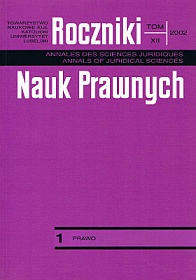Duty and Customs Proceedings in the Pre-partition Poland
Abstract
One find the origins of the development of customs law and customs proceedings as early as the pre-partition Poland. The customs system in that period mostly did not have a distinct and consequent leading idea from the viewpoint of the economic policy of the state. It was mainly directed at the interests of the nobility and the clergy. A number of new duties and tolls did not satisfy the needs of the state's treasury. Until the beginning of the fourteenth century there had been no formal distinction between duties and tolls, or fees of other names, which bore the character of duties and tolls. A toll should be understood a fee charged as anequivalent, mainly money, for some direct services (e.g. the construction of a road), and a duty was meant − in the Middle Ages − a fee that was not connected with any direct service, taken either for fiscal ends (fiscal duties), or political-trade (economic duties), or both ends (mixed duties). Tolls and duties were initially taken in nature, and later (in the eighteenth century) in money and nature and with time (starting from the fourteenth century onward) inmoney.
In the Middle Ages it was obligatory to supply goods to the nearest customs office, in order to go through some customs formalities and, possibly, pay duties. This obligation was, above all, expressed by a road constraint, i.e. the necessity to use certain roads that were customs roads, by which there were customs offices. There were several kinds of customs clearance (e.g. conditional clearance, export duty, transfer clearance), as well as particular stages of customs procedures. At the end of the Republic of the nobility some customs institutions were developed and well-defined by the laws of the Grodzieński Seym of 1793. During successive partitions of the Polish Republic, the invading countries introduced their own institutions and customs tariffs. The developing Polish customs legislation was replaced by the legal regulations of the invading countries.
Copyright (c) 2002 Roczniki Nauk Prawnych

This work is licensed under a Creative Commons Attribution-NonCommercial-NoDerivatives 4.0 International License.


